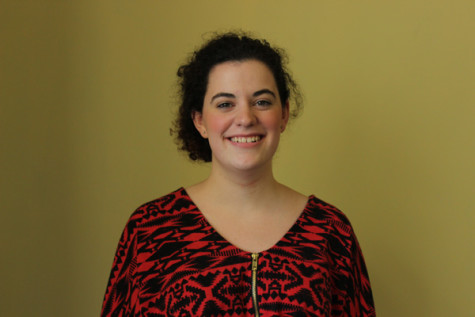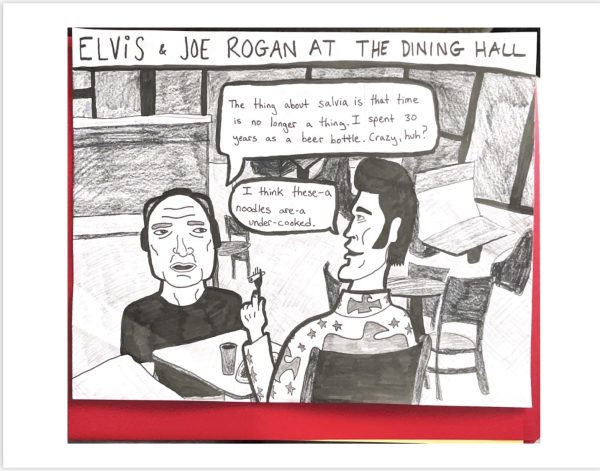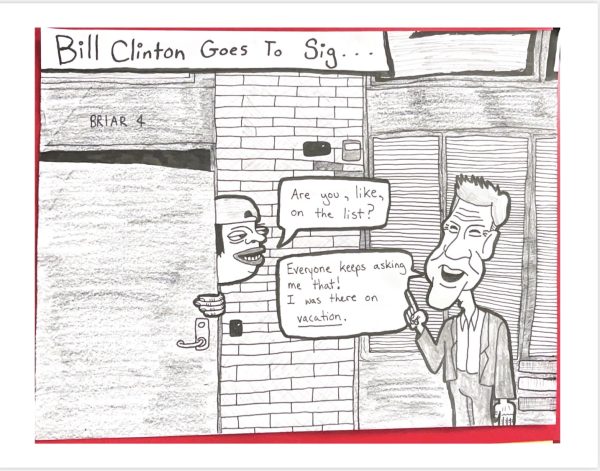Students and officials foster inclusion
April 20, 2016
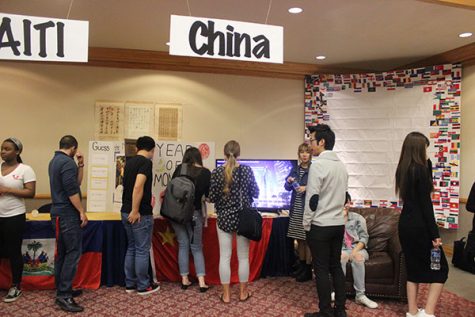
Festival attendees look at a booth about China.
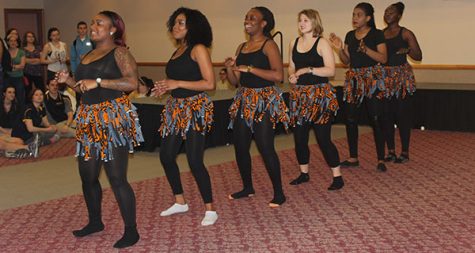
Students perform an African dance at the International Festival April 15 in the Cambria Room. The festival is an example of programming to promote racial inclusion.
Since University of Pittsburgh officials have dedicated themselves to gender inclusion at all campuses, it may be fitting to re-evaluate another section of inclusion: race. Students seem to have a mixed impression about Pitt-Johnstown’s racial inclusion.
Black Action Society president Karissa Arthur wrote a letter to the editor about racial insensitivity, published in The Advocate’s March 23 issue.
In the letter, Arthur critiqued the The Advocate staff’s vocabulary while covering a society fundraiser. The words had negative connotations and were offensive, she said.
In addition to the article’s offensive nature, students expressed offensive ideas through social media about the society’s fundraiser, according to what Arthur mentioned in the letter.
These instances were not the only significant ones this year, Arthur said in an interview. In October, a former student painted her face for Halloween, then posted the photo on Snapchat with an offensive caption, Arthur said.
A friend of the former student saw the photo and felt threatened, Arthur said. Though the friend was not a society member, Arthur said, the friend looked to society members for support.
In another instance, according to Pittsburgh television news station WTAE, a Pitt-Johnstown athlete remained an inactive bystander while witnessing a black man be physically assaulted in a Pittsburgh subway in May of 2015.
The athlete was sentenced to six months probation in February for his role.
Society members who know about the incident feel unsafe, she said, and feel they cannot rely on the police to protect them.
If an incident would occur, she said, the police might not arrive in time.
Student Affairs Vice President Shawn Brooks said student victims are referred to counselors and Diversity and Inclusion employees as standard protocol.
Witnesses and victims are encouraged to contact student affairs staff, the Diversity and Inclusion officer Laura Perry-Thompson or the Title IX coordinator Amy Buxbaum, Brooks said.
In addition, people can file anonymous online care reports concerning intolerance.
“University (officials take) a very firm stand against acts of intolerance, particularly those that place another student in fear,” Brooks said.
Though society members cannot do much in these instances, Arthur said they can provide moral support for people affected. Support is one of the society’s main goals.
“(The) Black Action Society (members’) main goal on campus is to spread inclusion and give students a place to fit in when they feel as though they don’t belong anywhere else,” she said in the letter.
The society does not purposely educate others, Arthur said. Its events are to strengthen the campus community and raise money for local charities, not to educate.
Educational programming and intercultural engagement is one of the administrators’ commitments, the Pitt-Johnstown website reads.
“We promote deeper respect for our common humanity and enrich the living-learning environment in which everyone is mutually valued and appreciated,” the website reads.
Programming examples are when author and activist Kevin Powell spoke about civic engagement and race March 23, activist Aja Monet read poetry March 30 and transgender writer Roberta Dostal read poetry Jan 27.
“I believe that such education is (on) extremely important part of the process in preparing our students for real world experiences, while also developing positive campus racial climate,” said Equity and Inclusion Senior officer Laura.
New students have an awareness and diversity session during fall orientation, Brooks said.
Though society members do not focus on education, members of another special interest group do. Chinese Students and Scholars Association members spread Chinese culture through events like the Chinese New Year’s Festival and the Mid-Autumn Festival.
Association President Meng Xing said he asked several Chinese students about campus racial insensitivity, but those he asked said they did not experience it.
“Students and faculty are all really nice and friendly to us,” he said.
“I think as long as American people know Chinese culture, the gap between Chinese (people) and American(s) will be smaller, and there will be less and less misunderstanding,” he said.
Arthur said she does not want any special treatment, but wishes people would just keep in mind that minorities have a different experience at Pitt-Johnstown because of their skin color.
“Be aware of the way you say things and the vibe you give off,” she said.

